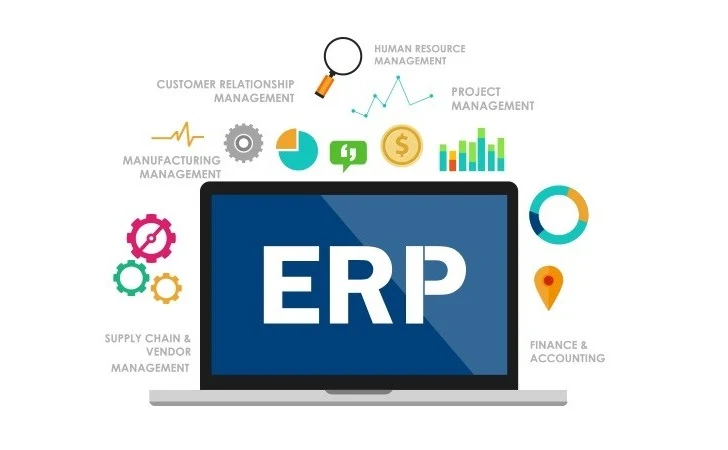What is ERP?
ERP is an enterprise level application to integrate all the business operations to manage the business, automate the business functions related to technology, production, services, inventory, and human resource. It is an enterprise level application that itself means that sophisticated peoples required to use the application. It is very complicated and divided into different modules, like Supply-chain Management, Customer Relationship Management, Employee Life-cycle Management, Human Resource Management, and Payroll Management, accounting, production management, etc. Most of the ERPs contain 3 Tier architecture. That means the software technically divided into three parts: presentation layer, application layer, and one central database. Presentation layer shows the data, forms to the end user. Application layer accepts, process the data, and manage the database. Database layer store all the transactions in a Relational database management system.
SAP, Netsuite, Sage ERP, Odoo, etc. are some of the well known ERP applications. Odoo is an open-source ERP, and hence, it is called open ERP.
Why ERP so important?
1) ERP is an investment: Initially setting up an ERP takes some money. Also, you need to give the training to your employee about the new system. But it integrates and shares the data from different departments, like product development, human resource management, stock management, supply chain management, etc. Since the data can be visible to everyone, it saves a lot of time of traditional paper works, emails, and letters, and ERP creates a smooth process in your business.
2) ERP analyses and makes reports of your business: As I said earlier, ERP record every input and output actions take place in your business to a central database. So it is effortless to analyse various aspects of the company and create the perfect, error-free reporting. If you are using a traditional system, then it takes many days. But ERP creates within a few minutes.
3) ERP increases productivity: The traditional methods take so much time and efforts to generating reports, monitoring of inventory, tracking of the time-sheet, calculating the efficiency of the employees, etc. And the chances of getting errors in the processes, rate of duplicate entry, etc. are very high in traditional methods. In ERP, the database refuses to create a duplicate listing, automate most tasks and generate reports within minutes. So it increases the productivity, efficiency, and profitability of the business.
4) ERP makes happier customers: Customers are the most crucial aspect of any businesses. Most of the modern ERP contains a customer relationship management(CRM) module dedicated to handling the customers. It helps to store the contact information, history of orders and billing, reviews, and feedback. It not only helps to understand the needs, desire, and demands of the customers but also helps to increase the customer visibilities that again improve the sales strategy or lead generations.
5) ERP improves inventory monitoring and planning of production: For a growing business, it is tough to monitor the inventory at real time using the conventional system. ERP provides a central database, supporting bar-coding, RFID tags, and serial number to keep every assets and component in every stage of the supply chain. It helps to keep the real-time tracking of items at different warehouses, manage the assets, and to monitor the manufacturing operations. So ERP optimises the production schedule, usage of equipment, and labours to at their maximum capacity.
Careers in ERP
ERP is a very complex enterprise application. So working with ERP requires some good knowledge regarding the ERP, business model, human resource management, rules and regulations, payroll management, etc. Based on the role and domain of the job, ERP offers three types of jobs. They are,
1) Functional consultant: Functional consultant should know about the working of various modules, and general information about the business model. The functional consultants required good knowledge in business, management, and accounting session, but there is no need for technical expertise. These people work with the presentation layer of the ERP application.
2) Technical consultant: The primary role of the technical consultant is to create a business model. It requires coding skill, networking skills, as well as business knowledge. They are creating programs and macros at the application layer of the ERP.
3) Techno-functional consultant: They need to handle both functional and technical roles. It is one of the leading roles because of new technology implementation like cloud, AI, Machine learning in ERP.
